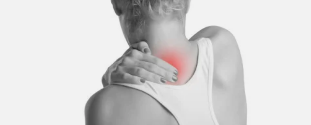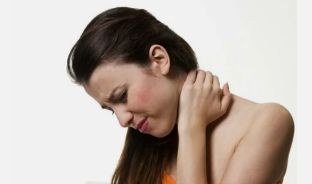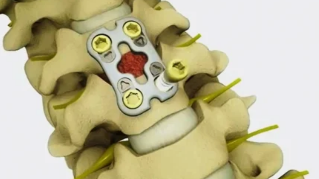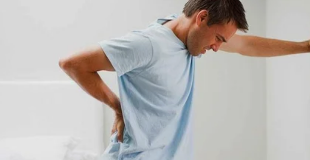The patient with cervical osteochondrosis should know how to remove the aggravation.

Treatment during exacerbation of degenerative disc disease passes under the doctor's supervision, observance of the appointments. At the time of the exacerbation, the doctor will recommend to stop playing sports. The allowed swimming on condition that after the pool the patient warmly dressed
It is important not to SuperCool. With the heat, you should be careful
Will soothe the pain position side-lying with folded knees. The pose helps to stretch the spine to relax pinched nerve. During exacerbation of is not to use massage. Gentle stroking with the use of analgesic ointments, gels. After manipulating the sore place is to wrap, to give the patient to sleep.
The period of aggravation of degenerative disc disease lasts 3 – 5 days. Depends on the degree of severity of the disease, the number of patients the vertebrae, the patient's age, compliance with doctor's recommendations. After remission of the pain, should start to move. But gradually, not SuperCool.
Why the disease is acute
It should be noted that the process of deterioration depends on the stage, it can occur to any of them, from the initial to the last. Aggravation always precede reason. Their main list looks like this.
- The patient made a sudden movement.
- In the cervical area extended to excessive load.
- Happened lifting weights or long-term displacement.
- The patient is under stress or when nervous.
- Made not a specialist massage. Either the technician did not know about the patient has degenerative disc disease, because he was not warned.
- There are sharp fluctuations of weather conditions.
- The patient had hypothermia of the whole body or to chill the neck area.
- After bath or sauna the patient plunged into the ice or just cold water.
- The age of the patient is significant, to which the intervertebral discs are worn and damaged due to age wear.
If not treated osteochondrosis, at whatever stage he may be, the aggravation will definitely occur sooner or later. Symptoms of exacerbation of osteochondrosis neck is necessary to know and to understand differentiating characteristics from other vertebrate ailments.
The symptoms of acute

The brightness of the severity of symptoms depends on the stage of pathology and the extent of its progression.
Their list the following.
- Pain in the parietal area.
- Reduction of skin sensitivity parietal area.
- Pain on one side of the neck.
- Pain in collarbone and shoulder.
- The severity of the language.
- Interruptions in breathing, it's not smooth.
- Soreness in cardiac region.
- Pain symptoms in the right upper quadrant.
- Headaches with pressure on the eyes either unilateral headache only in part.
- The crunch that is heard in the neck area from behind in the implementation of the tilt, nod your head or bend.
- Fog in the eyes, spots or points, hearing disorders and ringing in the ear.
- Pain and muscle weakness in hands, up to wrist.
For these symptoms it is hard not to pay attention to, nevertheless there are patients who, even in this situation don't hurry to visit a doctor and trying to help yourself with home remedies
Diet
The objectives of the diet in osteochondrosis includes:
- normalization of metabolic processes;
- prevention of calcification in the spine;
- restoration of the cartilage structure;
- strengthening ligaments of the intervertebral discs;
- reduction of excess weight and prevention of obesity. It is known that excess weight increases the load on the spine and provokes the development of osteoarthritis, and in patients with the disease is often diagnosed obesity.
Diet should be selected by the attending physician depending on the presence/absence of comorbidities. A single diet in osteochondrosis not.
What products should enter the menu:
- dairy products (whole milk and dairy products);
- vegetables, herbs. Special emphasis should be given to the cabbage, cucumbers, radishes, celery, beets;
- fruit and berry dishes, including jellies and compotes;
- vegetable oil;
- low-fat meat;
- jellied dishes, jellied meat;
- dark breads, biscuits, muffins;
- eggs;
- nuts, seeds, sesame seed;
- cereals;
- seafood (fish, shrimp, seaweed, mussels);
- non-carbonated water.
In the diet diet in osteochondrosis of the spine should be excluded:
- fat concentrated broth
- fatty red meat,
- refractory animal fats, poultry (duck goose),
- coffee and drinks containing caffeine (strong tea, chocolate).
Limit the consumption of sugary foods and drinks alkogolsoderzhaschih.
Causes and symptoms of aggravation of cervical degenerative disc disease
Osteochondrosis of the vertebral pathology of the skeletal system. When her violations occur of the intervertebral disc degenerative and dystrophic character. The deviation affects the tissue of the vertebrae, spreading the disease.
- VBN against the background of cervical degenerative disc disease: treatment
- Acupuncture osteochondrosis of the cervical
The average age of onset of illness from 30 to 35 years. Because of the wrong load on the spine and feet either because of traumatic injuries of the deviation can be diagnosed much earlier.
The main features supporting the development of the disease:
- Pain radiating in the arms, shoulders, recurring or constant sense of tension in the back and neck.
- The negative dynamics of osteochondrosis is accompanied by atrophic phenomena in the tissues of the muscles, the fluctuation of sensitivity, abnormalities in organs due to the compression and displacement.
- Headache, dizziness, frequent fatigue, discomfort in the hands.
- Stiffness, failure of slopes, turns, provoked by numbness, discomfort in muscles and joints, spasms, hypotension.
- Floaters and spots in eyes, noise in the ears.
Untimely therapy of cervical degenerative disc disease may go into a phase with severe exacerbations. Treatment in this stage should be a doctor.
Causes of abnormalities in the spine:
- Wrong getting weight spinal column — sock bags, hand baggage constantly on one shoulder or in one hand.
- Curved posture in a sitting mode.
- Too soft mattress and high pillow to sleep.
- Wearing shoes with the wrong anatomical structure, narrow, oppressive, high heels, causing muscle tension and aggravation of diseases of the spine, degenerative disc disease of the cervical part.
- Physical inactivity, excess weight, traumatic injuries of the back, legs, flat feet.
- The aging process of degeneration because of impaired blood supply to the spine.
- Physical fatigue, crises neuro-emotional system.
- The disturbed metabolism, diseases of stomach, intestines, accompanied by defective absorption of nutrients and minerals.
- Dangerous profession, working at sites with a strong vibration.
- The presence of a genetic predisposition to cervical degenerative disc disease with exacerbations.
- Non-observance of rules of healthy posture in the period of active growth, scoliosis.
- Dehydration for a long time. Irregular, unbalanced nutrition, lack of vitamins.
- The shift of load that occur during pregnancy in undeveloped muscular frame.
The aggravation caused by the seasonal influence, a way of life, can occur at an undetermined time.
Treatment

To have a correct and comprehensive treatment you need to consult a doctor. He will prescribe an effective survey to find the cause of the disease. Prescribe medicines, massages, medical gymnastics.
During exacerbation is prescribed the following medications:
- painkillers;
- chondroprotectors they are used for a long time and in order to restore cartilage;
- muscle relaxants help to remove the muscle spasm;
- nootropic drugs;
- vasodilators;
- vitamins D.
The treatment can be carried out, as in the home hospital. It all depends on how strong the symptoms and what complications. To solve it will only be a specialist. The doctor may send point massage and so on. If you do not follow the recommendations of the expert, it will lead to serious consequences.
You need to make in your diet dairy products, lean meats, fresh fruits and vegetables, nuts, cereals and fish.
Special attention should be paid to the food in which contains jelly, it is most often jelly. Olive oil should be consumed for salads.
It is best to eat the kind of food that is steamed, boiled and baked. To unsubscribe from salty, spicy, fatty, smoked products. It is forbidden to drink strong coffee, tea and abandon carbonated sweet water.

Massage treatments can help to remove the muscle tension and normalized blood flow. But it is necessary in the period of exacerbation of osteochondrosis to do it very carefully and it has to be performed only by a professional massage therapist.
If the person has severe pain, he needs to stay in bed. There are cases that the patient you do not get up. But it may not last more than three weeks, as muscles can atrophy. If people feel improvement, you can get up, but a maximum of ten minutes a day. All you need to do so says a doctor, otherwise it may lead to serious complications.
Prevention
It is much easier to prevent an aggravation of degenerative disc disease of the thoracic. And it is able to any person who cares about their health. In order to avoid exacerbation of osteochondrosis, you need to follow simple rules.
Definitely need to move more, because the pathology appears in people who sit a lot. Therefore, they occur stasis and impaired blood flow.  You need to regularly go Hiking and to go to the gym. This will help to prevent the aggravation of thoracic degenerative disc disease.
You need to regularly go Hiking and to go to the gym. This will help to prevent the aggravation of thoracic degenerative disc disease.
No need to sit on the drafts, because the spine can be drained. Will suffer and thoracic, and lumbar. It is strongly recommended to dress warmly in the winter, this also affects human health. Possibly shouldn't be in the cold if you don't want to hurt.
When you have extra weight, you need to get rid of obesity. To do not always as simple as we would like people. You have to sit on diets and to go to the gym. No need to choose fatty foods and a passive way of life, while sacrificing their health.
It is worth noting that it is extremely important to sleep. We are talking about what we need to buy mattress and pillow
They will help to keep the spine and neck in the correct state during sleep. As you know, due to mismatched bedding often appear problems with the vertebrae. So no need to save money on residential attributes, and then health will become much better.
The man himself can change the fact that the aggravation did not happen. For this you need to follow the simple advice and not to forget about your health. Also, it is necessary to complete a full course of treatment for the disease that in the future not have to suffer from severe pain.
Surgical treatment of cervical degenerative disc disease in the acute stage
Surgery may be recommended if the patient has severe pain that is not relieved with nonsurgical treatment. Surgery isn't usually performed when cervical osteochondrosis, unless a doctor determines that:
- The spinal nerve is pinched by a herniated disk or bone (cervical radiculopathy);
- Compressed spinal cord.
Depending on many factors, the operation is performed either from the front of the neck, or back. In some cases it may be necessary for both the front and rear access for the removal of compression and instability of the spinal cord. Each approach has its advantages and disadvantages. The attending physician will discuss with the patient which method is best for a particular case, as well as about the possible risks and consequences of surgery.
Spinal fusion is essentially "welding" process. The main task is the connection of the vertebrae so they fused into a single solid bone. Fusion eliminates motion between vertebrae and reduces the flexibility of the cervical spine, which eliminates the cause of pain.
When surgery is used bone material, called bone graft and promoting fusion of the vertebrae. Small pieces of bone are placed where there has been deleted the disk or bone. In some cases, the doctor may implant a synthetic spacer, or "cage" between two adjacent vertebrae. This cage usually contains bone graft material, providing a fusion of the two vertebrae. After installing the bone graft, the result is fixed with metal screws, plates or rods, to increase the speed of fusion and stabilization of the cervical spine.
Bone graft is extracted either from the bone of the patient (autograft) or from donor (allograft). If you use the first option, the bone is usually taken from the thigh region. The collection of bone graft requires an additional incision during the operation. This increases the operation time, and can cause increased pain after the procedure.

During anterior cervical discectomy, the surgeon removes a problem disc and bone spurs, and then to stabilize the spine by fusion of the spine. Usually the plate with the screws added to the front of the spine to create additional fixing. And at cervical corectomy instead of disk deleted the vertebra (bone), then the spine is stabilized, as in the previous method of operation.
There is also a laminectomy. In this situation, the arc is removed the bone that forms the back part of the spinal canal (lamina), including any bone spurs and ligaments compressing the spinal cord. Laminectomy relieves pressure on the spinal cord, providing additional space. While laminectomy provides complete decompression of the spinal cord, the procedure makes the bones less stable. For this reason, patients are often required to set the screws and rods.
Risks and recovery after surgery
Potential risks and complications to any surgery on the cervical spine include:
- Infection;
- Spinal cord injury;
- Reaction to anesthesia;
- The need for additional surgery in the future;
- Soreness or difficulty swallowing for some time;
- Voice changing;
- Shortness of breath at first.
Most patients can walk and eat on the first day after surgery. Depending on the type of procedure, the spine is attached a drainage tube for removing accumulated fluid or blood that may remain after surgery. Within a few weeks the patient will have difficulty swallowing solid foods. Some time will have to wear an orthopedic collar.
Whatever treatment of cervical degenerative disc disease in the acute stage are not chosen by the patient, it makes sense to consult with a specialist. Causes of cervical degenerative disc disease can be chronic stress, a sedentary lifestyle, hypothermia, incorrect massage techniques, or sports injuries. For speedy recovery you should follow all instructions of the doctor, not to be nervous, and do not overextend the neck. In the absence of a special orthopedic collar, it is desirable to sit in a chair with a headrest. During treatment of exacerbations should avoid sharp turns of the head, are not allowed to drink alcoholic beverages and do not visit baths and saunas. Regular massage, proper nutrition and the implementation of the chosen set of exercises will allow you to avoid re-aggravation of cervical degenerative disc disease.
Causes of exacerbations
The loss of locomotor activity and scored synthetic products markets, plenty of fast food has led to unhealthy diet more than 70% of the population. It is a favorable platform for the development of all types of chondrosis and other diseases.
An important role in the reasons for the development of osteochondrosis, heredity plays a and the patient has a previous injury, autoimmune diseases and hormonal disorders. Colds and hypothermia cervical also lead to the development of this disease.
Aggravation can develop because of many factors
In addition to these factors, there are a number of reasons for the development of this disease. Let's talk about each one in more detail.
Seasonal exacerbation
Basically, the risk of exacerbation of osteochondrosis of the cervical falls in two seasons – autumn and spring. The abrupt decrease of temperature leads to colds and the deterioration of patients with degenerative disc disease. More likely to suffer the patients with this disease of the cervical, as not all autumn wear scarves. Hence the shot in the neck, reduced immunity, and as a consequence, exacerbation of cervical degenerative disc disease.
When menstruation
Scientifically proven fact osteochondrosis exacerbation during menstruation no. But logically this can be explained as follows. In the "special" days of hormonal background of women dramatically rebuilt, this leads to the fact that estrogen levels decline, hurting the production of collagen and the exchange of calcium. Suffering of the skeletal system, hence the possible aggravation of degenerative disc disease.
Aggravation of degenerative disc disease possible during the critical days in women
After a bath
A visit to the baths is causing a lot of controversy about its harm or benefit. To give accurate advice on this issue can only be your doctor, as he is known on the extent of neglect of your disease, about the condition of your respiratory and circulatory systems. If you visit bath is not contraindicated, then take note of one Council.
With cervical osteochondrosis is a good one, if you are not allergic to honey. Before you go into the steam room, lubricate your neck and shoulders with honey, after visiting the steam honey is almost all absorbed. Repeat this procedure 2-3 times for one visit to bath
It is important to wrap yourself after a bath and cool down before going outside at least an hour. Otherwise you only aggravate the disease
Can I visit the baths in this disease, can only tell the doctor treating you
After the massage
Massage, is made competent expert, is aimed at relief of the patient with cervical osteochondrosis. Don't underestimate specialists of this profile. But if you trust the massage the person who has no proper medical education, the consequences can be dire, as improperly performed massage may cause exacerbation.
Aggravation can occur after improperly performed massage
Is it possible to do self-massage during a flare-up?
My answer is no. Self-massage and any other massage is contraindicated during this period. Otherwise you can only hurt yourself, because self-massage and massage mobilizes all tissue of the cervical, directly affects and is in contact with the vertebrae and nerve roots during different techniques.
Therefore, in the period of acute self-massage is contraindicated, but during the remission process and to maintain their recovery self-massage is even necessary!
I will not retell his article on self-massage, and just let me remind you the link if you want to remember this material more.
Dear friends, I hope my article was useful for you. Don't forget to do your neck to the development of complications and exacerbations, than to overcome all that through suffering and difficulties. Keep an active lifestyle and don't forget, therapeutic exercises, even in those cases when you never have.
What is the aggravation of degenerative disc disease
Chronic degenerative processes in cartilage intervertebral disc, localized in one or more areas of the spine called degenerative disc disease. As the progression of the disease pathology spreads to the intervertebral joints, bone tissue. In remission the patient may not feel any discomfort, but acute cases are accompanied by a severe long-term pain in various parts of the body.
Depending on the area of the spine, which develop pathological changes, isolated cervical, thoracic, lumbar and joint degenerative disc disease (occurring simultaneously in different departments). For each type of disease has its own symptoms, there are nuances in tactics, the treatment regimen.

All varieties of the disease distinguish three basic forms of flow during periods of relapse:
- Regressing is manifested in the initial stages; in this course each subsequent exacerbation occurs less intensively than the previous one.
- Typically sustainable – with regular physiotherapy treatment and monitoring of degenerative processes slow down, intensity of pain syndrome from one attack to another remains virtually unchanged.
- Progressive – the frequency of exacerbations increases, increase pain, pathological changes of the intervertebral discs progressing.
The duration of exacerbations depends on the form of the disease, the place of its localization, health status and individual characteristics of the patient. When light and stable stage duration of recurrence ranges from 2-3 to 7-10 days. In severe progressive form of the disease exacerbation lasts from one to three weeks. Active treatment continued for several months – regardless of the characteristics of the course and the type of degenerative disc disease.
Low back pain is considered a disease of middle or advanced age, its occurrence is associated with hereditary factors, to the conduct of an unhealthy lifestyle with excessive or insufficient load on the spine. In recent years the disease has become much "younger". Physicians even identified a separate species of the disease – juvenile which affects children and adolescents.























